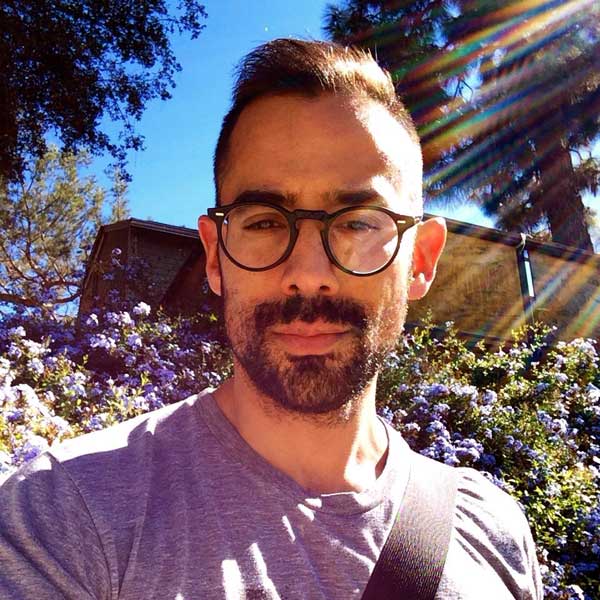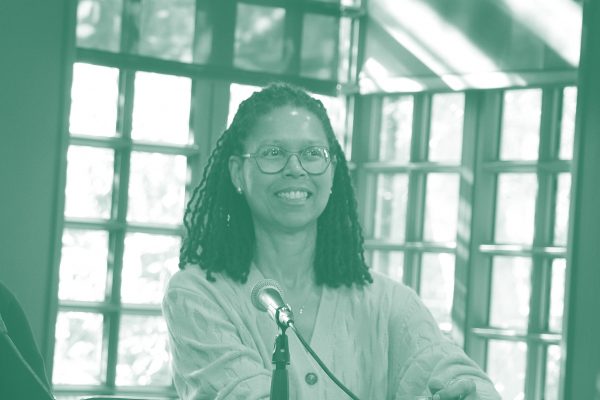
“There’s nothing more insidious / than manners,” writes Randall Mann. “The past is the the in the nightclub.” Given to the obsessive and possessive aspects of strict poetic form, the poems in Mann’s third collection, Straight Razor, perform a kind of violence at odds with the decorous. But as in the work of Wallace Stevens—“the the” echoing the close of his poem “The Man on the Dump”—it is in a blemished, brutal geography that we first hear of truth, and from the mess of the actual that we can build a place to revel in. In this interview, conducted over email last month, Mann discusses the sources of his poetry, its influences, the value of form and his experiences as a reader and writer. —Ricardo Maldonado
Editors' Note: Read Randall Mann's poem "I Resign" as part of National Poetry Month.
Ricardo Maldonado: Where do you typically find the germ for a poem? How did these poems come into being?
Randall Mann: My poems often grow out of a mix of memory, pinched conversation, restlessness, and low-grade desperation. I can’t believe I’m going to admit this, but I have an orange file folder on which I have written POETRY in large Sharpie-script; it’s full of scraps and images and ten-cent bits and crabbed scribbles and articles and words overheard. When I sit down to write, I usually don’t know where I’m headed, and these fragments tell me where I’ve been so that I can find, or not find, my way into a poem.
Maldonado: Straight Razor opens with a memory of Gainesville in the fall of 1992—the materials and settings of your poems, what lends them resonance in your mind and allows them to populate your poems?
Mann: That was a crucial time for me: I was starting to come out, starting to come into my own as a young writer, to look at the world around me—in this case, the lush, malicious landscape of Florida—in order to make sense of, maybe to represent, my inner world. I remember fairly clearly the wild-eyed possibility the night would bring then—gin and MDMA and men—and also that specific early-nineties fear of death, which is to say of HIV/AIDS. I don’t want to sound melodramatic, but there are times when I think I haven’t fully recovered from sexually coming of age during an age when sex felt like suicide. This stays with me, and the things I can’t shake often, sometimes, maybe, become poetry.
Even the most personal of great poems are politic because they say something profound, perhaps universal, about the impoverished richness of language and love.
Maldonado: What kind of somatic experiences interest you as a writer and also as a reader?
Mann: As a reader, I am interested in mystery, precision, loneliness, and lacerating self-awareness: all such gestures can become bodily in the hands of a good practitioner. (I will give as examples two pieces I love: Ian McEwan’s story “Last Day of Summer,” and Louise Glück’s poem “Summer at the Beach,” the last clause of which is: “when I didn’t move I was perfect.”) As a writer, I am interested in these things, as well as formal choices such as repetition and rhyme, which can help a poem become a precise, sensual experience.
Maldonado: Form seems to serve a regulative function in your poems, “civilizing” language as it replicates throughout your work. What do prosodic structures—the pantoum, in particular—offer by way of refraction in the context of routine, temporality and talk?
Mann: I like regulation, if for no other reason than to test the extent of how I might thwart it. I love the pantoum—I sometimes say the pantoum is my comfort zone, god help me—because the repetition forces me to consider the currency of the words chosen, asks me to qualify the choice, to civilize, as you say: I must ask, are the diction and syntax rich enough to be said, and then said again? I think its unrelenting structure makes the pantoum perfect for elegy, which is why I chose to use it as such for one poem in the book, “September Elegies,” in which I memorialize four bullied queer boys who committed suicide.
Maldonado: Is there a particular logic or theory behind your use of the line and the line break?
Mann: No theory, but I think of the line as a unit that demands integrity, i.e., it exists as a part of something larger but to some extent should be able to stand on its own. One great thing about metrical verse is the epigrammatic possibility of lines, the authoritative music. And the line break is a potent, subtle tool in a poem. For instance, in that pantoum “September Elegies,” twenty-seven of twenty-eight lines are end-stopped, which I hope slows the poem down, makes it more emphatic, more contained, more desolate.
Maldonado: Your poems stage a concern with the queer code. What do you think compels the homosexual in society to adopt and deploy a distinct set of manners and language that could/would seem to constitute a code?
Mann: I hesitate to speak about “the homosexual in society”—although I rather like that dated phrase; it sounds like an exposé from the 1960s—but I can say that, for me, code is a way to survive, push against silence, name a predilection without naming it. When one is marginalized, things of course are not what they are at baseline, so one must traffic in metaphor: the casual look that might also be inquiry and proposition; the friend-of-Dorothy doublespeak; the color of an article of clothing, more than fashion.
Maldonado: The poems in Straight Razor live with the “gin-soak dread / that an acronym was festering inside” while expressing and relishing in an unknown, perhaps blind, or blinding joy. How do you reconcile the sentiment of fear with its indulgence in the context of desire?
Mann: But how could one reconcile desire in the absence of fear? In other words, if I know everything about a situation, if I know I’m safe, then where is the curiosity, which is to say desire, which is to say the unknown, which is to say fear? I don’t call this indulgence; I call this being alive.
Maldonado: Is there a kind of politic, or oblique political treading, that a poem can perform? Can poetry inform experience enough to make it affect the national dialogue?
Mann: I think so. Even the most personal of great poems—Robert Hass’s “Meditation at Lagunitas,” let’s say—are politic because it, in this case, says something profound, perhaps universal, about the impoverished richness of language and love. I can’t speak to the national dialogue, but I once memorized this poem with someone I loved—and it’s political, because queer love, all love, is destabilizing.
Maldonado: Other writers, you have said elsewhere, are everything to you. Donald Justice’s take on experience and its refraction through the formal structures of poetry seems influential, if not crucial, to your own practice. Who else’s work do you visit when you write, and why?
Mann: This could be a long list, so let me pick three living writers: Mary Gaitskill, for her exquisite combination of ruthlessness and vulnerability; Carol Frost, for her humanity and shameless beauty; and Louise Glück, for her oracular voice and her deprivation.
Maldonado: Lastly, are there any landscapes or events you feel compelled to discover/recover after having completed your third book?
Mann: I want to know more about my grandfathers, both longshoremen in Southern California, both long dead. I want to know more about the erasures of my multiracial past. And I hope there is some unknown landscape or event that catches hold of me and refuses to let go.
Read Randall Mann's poem "I Resign" as part of National Poetry Month. Photograph courtesy of Randall Mann.







